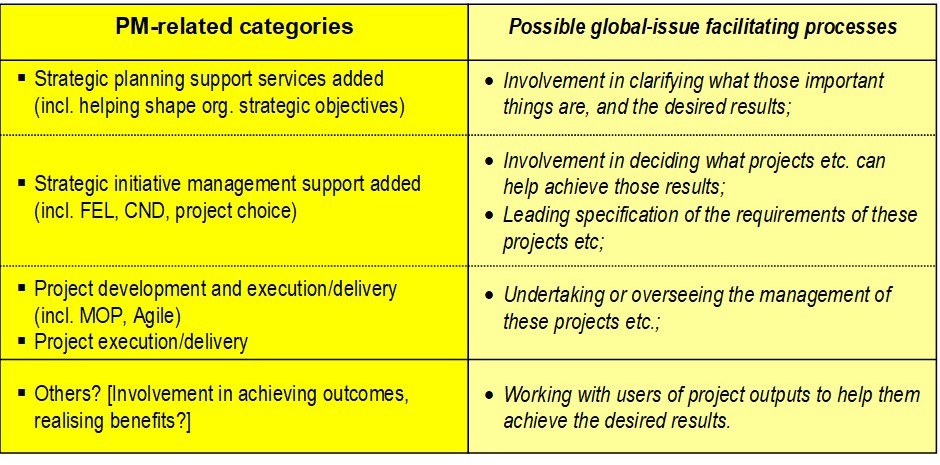to help address climate change
and other global problems
FEATURED PAPER
By Alan Stretton, PhD (Hon)
Sydney, Australia
INTRODUCTION
This article has been stimulated by Pells 2021: Project management needs a higher purpose! In particular, I want to start discussions on one of the key questions posed by Pells with regard to global crises and related issues – “But how can PM [Project Management] really help get important things done?” (p.9).
I will first propose an embryonic framework with a basic list of possible global problem-solving facilitation processes, and with a broadly aligned group of PM-related services which derive from previous articles. This is followed by a more detailed discussion of possible contributions by the latter to the global-related facilitating processes – which are substantial – and then of some impediments to actually implementing them. It is contended that the latter are also substantial, but are exacerbated by a pervasive product-orientation within the project management avocation, and by its failure to define the nature of its business in terms that suggest its relevance to resolving wide ranges of problems, including major global issues. Possible approaches to facilitating such a paradigm shift are tentatively suggested.
AN EMBRYONIC FRAMEWORK OF POSSIBILITIES FOR PROJECT-RELATED MANAGEMENT TO HELP RESOLVE KEY GLOBAL ISSUES
Possible global-issue facilitating processes
It seems to me that perhaps the most obvious ways in which project management (PM) could help resolve important global issues are through the following range of what I am going to label as global-issue facilitating processes:
-
- Involvement in clarifying what the important issues are, and the desired results;
- Involvement in deciding the initiatives that will best help achieve those results;
- Specifying the requirements of these initiatives and their component projects;
- Undertaking or overseeing the management of these projects etc.;
- Working with users of project outputs to help them achieve the desired results.
But, just how well prepared is project management to offer such a range of processes? We will first look at some of the many different ways in which project management, and extensions to it, are currently practised and/or discussed.
Project management (PM) pluralism: A PM-related categorisation
There are many different formats in which project management (PM) is perceived and practiced. In Stretton 2020h I identified the following categories of project management, and extensions from them. These are arrayed vertically in order of the increasingly broader scope of their activities, as I identified them in the context of their contribution to organisational strategic management.
-
- Project execution/delivery
- Project development and execution/delivery (incl. MOP, Agile)
- Strategic initiative management support added (incl. FEL, CND, project choice)
- Strategic planning support services added (incl. helping shape org. strategic objectives)
- Others
I will be discussing these in more detail shortly, as we explore some parallels between the above project management (PM)-related categories and the earlier list of facilitating processes, as now summarised.
Aligning PM-related categories with possible relevant facilitating processes
In Figure 1 below, I have changed the order of the above PM-related categories to their broadly corresponding facilitating processes.
 Figure 1: An embryonic framework – Aligning PM-related categories with facilitating processes
Figure 1: An embryonic framework – Aligning PM-related categories with facilitating processes
We now discuss each of the aligned groups in more detail, in the vertical order shown in Figure 1. We will look particularly at opportunities that appear to exist to extend the range of PM-related categories to be more fully involved in global-issue facilitating processes. Later I will discuss impediments that appear to stand in the way of such involvements.
More…
To read entire paper, click here
How to cite this article: Stretton, A. (2021). Towards extending the scope of project-related management to help address climate change and other global problems; PM World Journal, Vol. X, Issue II, February. Available online at https://pmworldlibrary.net/wp-content/uploads/2021/01/pmwj102-Feb2021-Stretton-extending-project-related-management-to-help-address-global-problems.pdf
About the Author

Alan Stretton, PhD
Faculty Corps, University of Management
and Technology, Arlington, VA (USA)
Life Fellow, AIPM (Australia)
![]()
Alan Stretton is one of the pioneers of modern project management. He is currently a member of the Faculty Corps for the University of Management & Technology (UMT), USA. In 2006 he retired from a position as Adjunct Professor of Project Management in the Faculty of Design, Architecture and Building at the University of Technology, Sydney (UTS), Australia, which he joined in 1988 to develop and deliver a Master of Project Management program. Prior to joining UTS, Mr. Stretton worked in the building and construction industries in Australia, New Zealand and the USA for some 38 years, which included the project management of construction, R&D, introduction of information and control systems, internal management education programs and organizational change projects. He has degrees in Civil Engineering (BE, Tasmania) and Mathematics (MA, Oxford), and an honorary PhD in strategy, programme and project management (ESC, Lille, France). Alan was Chairman of the Standards (PMBOK) Committee of the Project Management Institute (PMI®) from late 1989 to early 1992. He held a similar position with the Australian Institute of Project Management (AIPM), and was elected a Life Fellow of AIPM in 1996. He was a member of the Core Working Group in the development of the Australian National Competency Standards for Project Management. He has published over 200 professional articles and papers. Alan can be contacted at alanailene@bigpond.com.au.
To see more works by Alan Stretton, visit his author showcase in the PM World Library at http://pmworldlibrary.net/authors/alan-stretton/.









